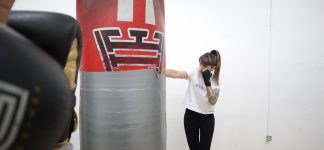
Things are not appreciated until they are lost says the popular saying. In prison, that saying acquires its full meaning. Prison limits, restricts, and makes it impossible many things that we do not give importance or value to while free, such as having a well-paid job. Being able to study or train in any specialty or discipline with all the resources and means: teachers, tools, internet, etc., deepen with a master’s or a doctorate. Practice any sport, attend concerts, theaters or cinemas…, walk without direction, without hurry, enjoy a good menu or wake up late on a Sunday, are just some of the things that are lost or greatly limited when entering prison. Entering prison changes, alters, and disrupts all aspects of a person’s life. Furthermore, one must take into account in what state they may arrive at prison considering how they have accessed it: forcibly (preventive detention) or voluntarily (to serve a sentence). It would be impossible to individualize each case, each inmate, since the particular circumstances of each individual present infinite variables: the typology of the offense, their family, social, and work history, their psychological and personal profile, their character, their life experiences, their education and knowledge, etc. Even with such a wide range of profiles and personalities, when the time comes and after accepting where they are, they ask themselves a question, and now what? And although the answer largely depends on each individual, it cannot be ignored that the vast majority of them require help, collaboration, and support. Article 25.2 of the Spanish Constitution indicates that “Deprivations of liberty and security measures shall be aimed at rehabilitation and social reintegration…” Similarly, the General Penitentiary Organic Law states that “Penitentiary institutions […] have as their primary purpose the rehabilitation and reintegration of the convicted…” “They also have a care and assistance role for inmates and released individuals.” Consulting with professionals For the preparation of this report, we have consulted with various professionals, including social workers from different centers prisons and Social Insertion Centers (CIS), and all agree on the importance of working for change. This means not giving up just because you are in prison and analyzing aspects of behavior that can be modified and improved. Summed up in three words: acquire good habits. Food, hygiene, aptitude, sports, organization, or culture are the basis of change, as they tell us. This, we can say, is the part that can depend on each individual, but what about those who cannot even do that? There are those who arrive in a physical, mental, personal, and emotional state that even for those basic changes in habits and behavior require help. And not to mention in the aspects directly related to their crimes, where issues of equal or greater importance arise to address and support for that rehabilitation and reintegration emphasized by the Constitution. Since a person enters prison and joins the assigned module, the contact with the professionals is insufficient in many cases, as the inmates we have spoken to tell us. Are there qualified professionals for such an important task? Yes. Are they sufficient? Obviously not, emphasize these professionals. “In Soto del Real there is not much depth beyond because essentially there is a lack of professionals. Because some of us cover an average of two or more modules and that greatly limits the time and resources that should be dedicated to analyzing the needs and particularities of each person,” they highlight. Having more professionals and resources would mean offering truly individualized actions beyond the ITP (Individual Treatment Program). On the other hand, the inmates of Soto del Real consulted, emphasize that they may have interviews sometimes with all or some of these professionals on basic, administrative, organizational and/or control aspects upon arrival, but that rarely is a sufficient level reached to provide help with change, rehabilitation, and reintegration that is so much needed. The right questions are not asked, they tell us: How are you doing?, What do you need?, or What can be done for you? But without questions, how can you tell who is in front of you beyond their crime? “It is normal for a long time to pass without any professional having a proactive conversation with us since arrival at the module. So how can decisions be made about us when only five or ten minutes have been spoken?”, comments an inmate of Soto del Real. In that need for treatment, improvement, and change, for which they must work and collaborate proactively both the inmate and the professionals they depend on, activities, training and socio-labor integration play a key role. But then, what can an inmate do if they don’t know where to start? Knowing the difficulties that both professionals and inmates face, and focusing on the latter, what should an individual inmate do if they see that they do not have the information or the support they need? In prison there are many restrictions, but there are also means and personnel that, although with limitations and scarce resources, can help to take the first steps towards a better future. Each prison, and more specifically each module within it, has assigned professionals to whom all questions, doubts and concerns should be directed. These professionals, after gathering information about each inmate through interviews or records, will establish a PIT divided into two levels of actions: Priority, which are aimed at intervening on factors directly related to their criminal activity such as drug dependence, aggressiveness, socialization; or on their basic deficiencies such as their knowledge, education, work habits, etc. And Complementary, which are not as directly related to the former, but complement them. This is when individual proposals for evolution and improvement with job, educational or cultural options could be offered to the inmate. Show them, explain them and encourage them to start, as they may not know where to start, may not feel capable, or may feel blocked. “Many of us need help” they repeat to us over and over again.
Actions for satisfactory progression
In prisons, one can collaborate, work, train, study… These are essential actions for a satisfactory evolution and progression, but it is work that acquires a special connotation for what it can offer to those who must remain in prison for a long time.
In particular, it is important to mobilize and act in order to obtain a job within the prison, trying to access one of the paid positions offered in all prisons and penitentiary centers. This does not mean that it is easy or simple to achieve. Not everyone who applies can work, as unfortunately there are not enough positions and jobs to cover the existing demand (something that we demand from here due to the enormous benefits it brings to those serving a prison sentence. Even more so when the Constitution itself indicates that “In any case, the [person sentenced to prison] shall have the right to paid work and the corresponding benefits of Social Security […]”). Achieving a job within prison, during the time a sentence is served, should be a priority objective for both the inmate and the professionals they depend on, as it not only allows for some income, but also strengthens work habits that will be essential after regaining freedom.
It must also be considered that the benefits of prison work benefit everyone. An inmate working means that they obtain a certain autonomy with which to cover basic needs during their sentence, thereby avoiding being an additional burden to their families. Also, their families can benefit from receiving financial help from the inmate to support family expenses. And we must not forget that in cases where sentences include civil responsibilities, these can be benefited if the person responsible works.
But it’s not just work. Improving educational level and studying is another action that should be given special attention. This should be offered and facilitated to all inmates during their time in prison. Although there are currently different options available; from Spanish for foreigners to computer skills at a user level, passing through basic studies, ESO, to access to university for people over 25 and 45 years old or university degree studies… achieving participation or incorporation is not as simple as it should be. For example, the economic costs associated with certain branches of study are striking. The fact that study manuals or materials are not provided in some cases, and must be paid for by the inmate or their families when they lack financial resources. Another striking example is the lack of scholarships for university studies if the applicant already has a previous degree. Improving cultural and educational levels can offer new personal and job opportunities in the future, and the administration, in these cases, should provide all the means to promote them, as Concepción Arenal said, “open schools and prisons will close”.
Another variable to consider is vocational training. The prison offers options in this regard but we encounter the same problems; an informative paper on the notice board, zero counseling, scarcity of places and little variety of training courses that vary depending on the center where the sentence is being served. In Soto del Real, for example, courses in food handling, cooking, pastry making, baking, gardening… are offered but the supply is extremely lower than the demand.
While it is true that the first step must be taken by the inmate, it is necessary for the institution to have the necessary tools to accompany them in the process, for technical teams to get involved to facilitate their access and progression, and for institutions to provide adequate and sufficient means, promote them and encourage them, as otherwise there is a risk that the prison will only fulfill its punitive (punishment) objective and not the objectives of reeducation and social reintegration that our Constitution includes.
There is a risk that the prison only fulfills its punitive (punishment) objective and not the objectives of rehabilitation and social reintegration.
Accessing semi-freedom
The foundation of the open regime goes beyond simply softening penalties. The open regime is configured as an important means of support for the socialization of individuals who, in their life trajectory, have enough self-responsibility to justify the absence of strict controls in the fulfillment of their sentences. The progression of degrees is set out in the General Penitentiary Organic Law (LOGP). However, reaching a CIS can be achieved not only through the granting of the third degree, but also through article 100.2 of the Penitentiary Regulations, which is a combination of the second and third degree. This is important to know because the importance of evolution, which has been addressed at the beginning, not only strengthens, provides resources, and positions individuals better to face the future in freedom, but also brings them closer to it. Leaving the prison to join the assigned CIS is a momentous moment in the life of anyone serving a sentence of deprivation of liberty and represents the moment to demonstrate and prove that they are prepared. Let’s say, now, that there is an opportunity to make visible the changes and evolution. So, are we prepared? Have we prepared adequately? Have we made good use of our time?… This is where having made good use of time in prison, choosing to change; working, studying, or training allows individuals to join the CIS with more and better resources to access the job market.
Objective: Working for freedom
If the importance of working has been highlighted previously, in this second stage it becomes essential. At this moment, a status close to freedom has been reached and work is the basic starting point for normalization for full reintegration into society. For this reason, the labor aspect and truly important milestones to facilitate a first job require more attention. All professionals consulted in this regard emphasize an important and essential aspect that will speed up the incorporation into the job market, as well as facilitate any procedure or management in life in freedom. This is the following documentation:
– Valid ID or NIE. This is the document that specifically identifies us and is essential for any procedure or transaction. All penitentiary establishments have means for the proper renewal of the identity document in case it has expired or is about to expire.
– Driver’s license, if applicable, must be up to date. Any exit can be used to manage its renewal and have it ready when the time comes, as it is a very useful document that can facilitate that first job.
– Public transport card is the best way to move around the city, so it is advisable to obtain the Public Transport Card. Remember that it is time to move around freely.
– Registering in the General Social Security System where you will be able to have the Health Card and with it, the essential affiliation number for any subsequent management with Social Security regarding social and labor benefits.
– Current account. A bank account is necessary. Nowadays, it is essential to have one to receive, for example, the amount of the salary.
– Job Demand Form (DARDE), essential for formalizing any contract and one of the first things that must be managed upon joining the CIS. This is a quick and simple procedure that can be done online or in person by requesting an appointment.
– Other documents. It is important and very convenient to gather all documentation related to work experience and acquired knowledge such as titles, diplomas, training certificates, etc., that have been accumulated over time and can justify courses, studies, knowledge, experience, etc. This will be very valuable when creating a resume and as a cover letter in the active job search.
– Registering in the Cl@ve system. This can be done easily from a mobile phone, so it can be taken advantage of during one of the leave outings to do so.
– Create an email, an email address if you don’t have one.
– The Certificate of Registration is another important document to have updated at the time of joining the CIS. It can be managed and printed easily using the Cl@ve Pin we have talked about. Surely, at the CIS, they will advise on gathering any additional documents that may be necessary or beneficial for entering the job market. In addition, arriving at the CIS with most of the documentation prepared will not only greatly expedite any process related to employment, but will also project an image of an organized person, which will undoubtedly be beneficial.
From the prison to the CIS
Upon joining a CIS, in the first days, they will be interviewed by the corresponding technical team. These will be the usual ones: Psychologist, Social Worker, Educator, and Jurist, but in the CIS there is the figure of the Job Coordinator, which is a key figure. Also, alongside the technical team are the Reintegration Technicians, who according to the Tomillo Foundation “are essential to help achieve these objectives. Members of the different social entities that collaborate with the program and who are involved from the first minute, and throughout the process, in providing support and advice to the person deprived of freedom.”
This coordinator, after an interview and trying to understand the concerns and needs of the inmate (always in terms of employment), will create a personalized socio-labor integration itinerary focused on their skills and professional competencies.
This itinerary includes support, training, community service project, career guidance, mediation, and follow-up. For this, the technician will make an initial assessment of the capacities, needs, difficulties, and/or limitations to offer a personalized solution, in this case, aimed at insertion into the labor market.
Regarding employability, “there are numerous job opportunities through agreements established with companies of various profiles and sectors,” according to the Foundation. “Retail and customer service (commerce, hospitality, food…) In specialized trades in construction and services (electricity, plumbing, HVAC…) In the logistics sector (shipments, deliveries and packaging, drivers, etc.)”
Something that social workers consulted constantly emphasize is “the trust that must exist between the technical team and the inmate who is just joining the open section.” This is key, as indicated from this section of the Las Palmas I Penitentiary Center in the Canary Islands. “Doubts, fears, and concerns should be shared, and we should be counted on to find solutions to any issues that may arise. You will spend more time outside (living) than in the CIS, so trust must be reciprocal at all times,” they emphasize in this regard from Victoria Kent.
To obtain that first job, support will be provided, but it will not be immediate, they tell us.
Under no circumstances will an inmate be kept in a lower status when, due to the evolution of their treatment, they deserve to progress.
The Work Coordinator and the Reintegration Technician will essentially be the ones assisting in this purpose. However, they emphasize that “one must not forget that it must be oneself who must move and act until the objective is achieved.”
Self-employment is as valid an option as working for someone else but it involves greater responsibility and discipline because it is not enough to just say I want to start this or that, or do this or that. Having a good idea is not enough. A project is needed. If one truly chooses self-employment, a well thought out and structured idea must be presented, grounded and documented, evaluating all aspects before discussing and presenting it as a real option.
For certain profiles, it is highly valued if one can balance work with studies and/or training. This is the same as life in general, it is not easy to balance studies, work, and family but, progress and improvement require effort and these efforts are appreciated by our environment. It may be an option later on. At the beginning, it is better to start taking small but secure steps. Reaching this point is the beginning of the end of a long journey that, if properly taken advantage of, can turn into a new opportunity.


